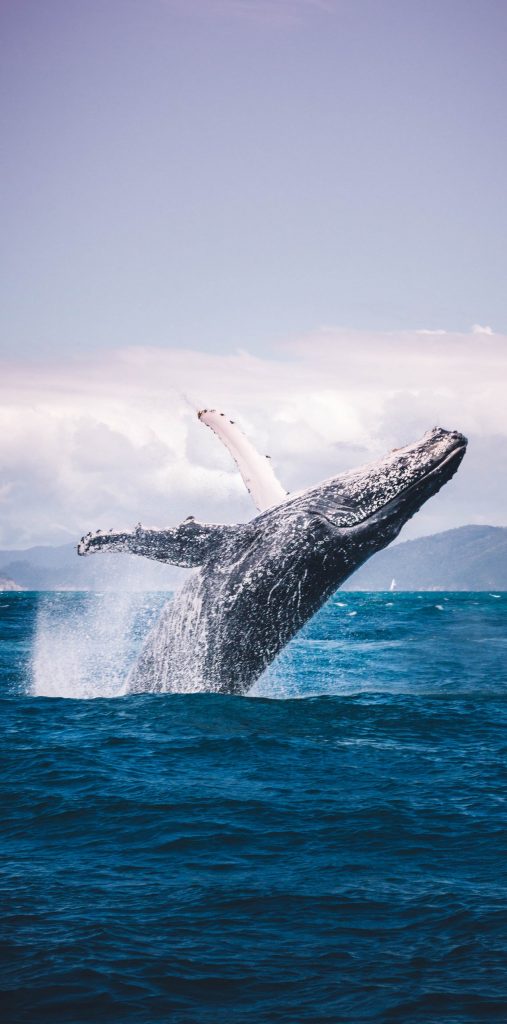ISSUE NO. 26: WHY WE SHOULD STOP CARING ABOUT WHALES
 If we want to build and maintain sustainable societies and sustainable businesses, we need to stop caring about whales.
If we want to build and maintain sustainable societies and sustainable businesses, we need to stop caring about whales.
Don’t get me wrong, I like whales as much as the next person. But they can’t survive in a vacuum. (Really. As we’ve learned from the sci-fi canon, whales don’t do so well flying through space alongside potted plants. A transparent aluminum tank provides a much better method of space travel. But I digress…)
Whales are charismatic megafauna (see links below). They’re loveable, majestic creatures that breathe air, nurture their young, and visit the most mysterious corners of the planet. And we humans really like them! We like whales so much that when confronted with the idea that our activities are hurting them, we very willingly buy into campaigns that go to great lengths to save them. And too often, this comes with the mentality that the only way to save the whales (and other endangered species) is to stop the destructive industrial activities that kill the planet and threaten our future. Logical, right?
Wrong.
Turns out, there are actually very good reasons why our industrial, energy, and business systems work the way they do, and a lot of really smart people have worked extraordinarily hard to develop systems to minimize adverse environmental impacts of industry. And most of the time these systems do a pretty good job. (Also, it turns out, these smart people spend a LOT of time thinking about whales.)
So why shouldn’t we still try to save the whales?
Of course we should save the whales. But to do so, we need to realize that whales are just one tiny (big) piece of a larger ecosystem. Whales can’t flourish (or even survive) if they don’t have food to eat. Or places to shelter from predators and nurture their young. Or the ability to communicate with other whales. So actually, if we want to save the whales, we should put a lot more focus on the wider ecosystems that support them, and ultimately, the biodiversity that supports the ecosystems’ functions and resiliency.
And therein lies the problem: Biodiversity as a conservation goal is way less intriguing than whales. (“Save The Biodiversity!” doesn’t have quite the same ring to it). But preserving, supporting, or even enhancing biodiversity, supports ecosystem services, which provide real, measurable benefits to humans, businesses, and society.
The challenge is that assessing baseline biodiversity levels, measuring biodiversity impacts, defining key biodiversity indicators, and developing location-specific, science-based, actionable, effective solutions that can be implemented by business and society is much harder than it might seem. (Certainly harder than campaigning for your favorite threatened whale species!)
Guidance exists from a variety of scientific, business, NGO, and government sources on developing metrics and best practices to support responsible operations that support biodiversity. But in many ways, and for many businesses, “measuring” and “managing” biodiversity impacts remain elusive goals.
One thing remains clear though: Developing solutions to understanding, preserving, and managing biodiversity is a critical challenge not only to 21st century society, but also to 21st century business. And only through managing biodiversity will we be able to save the whales.
Author’s note: Much appreciation to Douglas Adams and The Hitchhiker’s Guide to the Galaxy for the description of a sperm whale in space, and to the creators of Star Trek IV: The Voyage Home for envisioning how humpback whales might participate in space and time travel. We at Acorn International do actually care about whales and support efforts to protect both whales and other biodiversity.
For additional thoughts on biodiversity, the ecosystem approach to environmental management, and how whales are connected to ecosystem services, we offer the following resources:
- “Biodiversity A-Z” (website). This website is produced by the UN Environment Programme World Conservation Monitoring Center and provides an excellent resource for concise definition and discussion of biodiversity and related concepts. Their discussion of the ecosystem approach to management is especially thoughtful.
- The IUCN Business and Biodiversity Programme. This group, along with collaborators in the business and conservation sectors, has recently released draft guidelines for planning and monitoring corporate biodiversity performance.
- Relevant scientific literature on whales, charismatic megafauna, ecosystem services, and biodiversity:
- Roman, J, Estes, JA, Morissette, L, Smith, C, Costa, D, McCarthy, J, Nation, JB, Nicol, S, Pershing, A, and Smetacek, V. 2014. Whales as marine ecosystem engineers. Frontiers in Ecology and the Environment, 12(7):377-385.
- Cook, D, Malinauskaite, L, Davíðsdóttir,B, Ögmundardóttir, H, and Roman, J. 2020. Reflections on the ecosystem services of whales and valuing their contribution to human well-being. Ocean and Coastal Management, 186:105100.
- Albert, C, Luque, GM, and Courchamp, F. 2018. The twenty most charismatic species. PLOS ONE, 13(7):e0199149.
- McClenachan, L, Cooper, AB, Carpenter, KE, and Dulvy, NK. 2012. Extinction risk and bottlenecks in the conservation of charismatic marine species. Conservation Letters, 5(1):73-80.
News & Notes

Acorn International
1702 Taylor St, Suite 200B
Houston, TX 77007, USA
1213 Purchase St
New Bedford, MA 02740, USA
